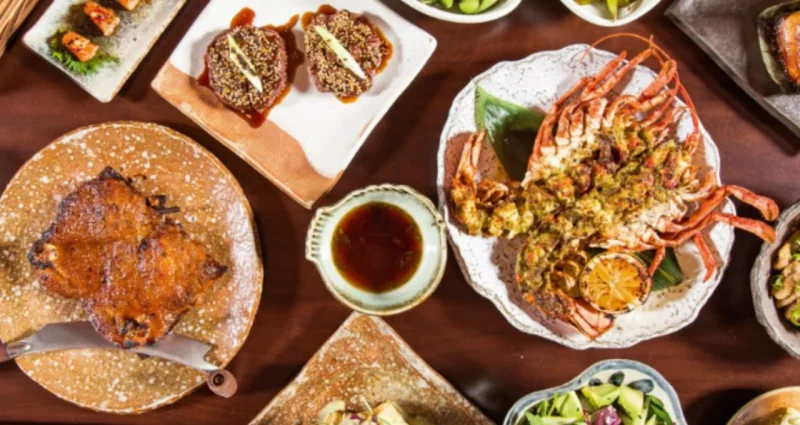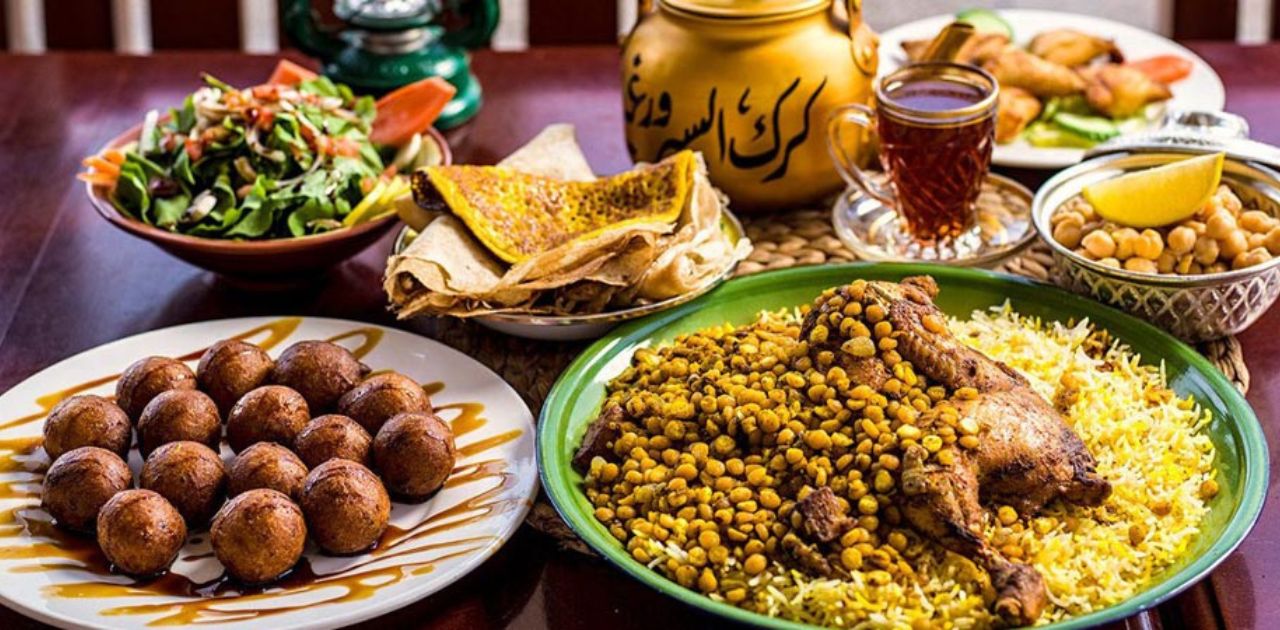Dubai is a city where people from all over the world live and work. And that’s exactly why its food is so special. You’ll find flavors from the Middle East, South Asia, the Philippines, Africa, and Europe, all in one neighborhood.
Some people go out to eat every day. Others cook at home but still grab a cup of karak or a late-night shawarma. Whether you’re here on a short visit or planning to stay for years, trying the best food in Dubai is part of daily life. It’s not just about fancy restaurants, it’s about comfort, routine, and finding what feels like home.

Everyday Dishes That Locals Keep Coming Back To
Some foods in Dubai are not just popular, they’re part of the weekly routine. These are the dishes you’ll find at family dinners, work lunches, or weekend gatherings.
Take Harees, for example. It’s a mix of wheat and slow-cooked meat, usually chicken or lamb. It’s served during Ramadan but also on colder days because it feels warm and filling. It tastes simple but rich, and people say it reminds them of childhood.
Then there’s Machboos, a spiced rice dish made with meat or fish. It’s similar to biryani but has a more Gulf-style flavor. You’ll find it in traditional restaurants and even at some hotel buffets.
Balaleet is another local favorite. It’s sweet saffron noodles served with a fried egg on top. Some eat it for breakfast, while others enjoy it as a light dinner.
Don’t forget the desserts. Luqaimat, crispy dough balls dipped in date syrup, are sold at every cultural festival. They’re golden brown on the outside, soft inside, and often topped with sesame seeds.
These are all part of traditional Emirati cuisine, and while not everyone eats them every day, most locals and many expats try them at least once and fall in love.
Street Food in Dubai That’s Worth the Queue
You can’t talk about Dubai’s food without mentioning its street food. Cafeterias, food stalls, and food trucks are everywhere. Some places have lines even after midnight. Why? Because the food is quick, tasty, and cheap.
The first thing you’ll notice is how many people are holding a shawarma wrap. It’s soft Arabic bread filled with chicken or beef, garlic sauce, pickles, and fries. Some versions come spicy, and others have extra cheese. No two shawarmas taste the same, but most of them are really good.
Next up is Karak Chai. This strong, sweet tea comes in small cups and is brewed with cardamom. Almost every local cafeteria sells it, and many people grab a cup during breaks or after dinner. It costs only 1 to 2 AED, but it’s part of daily life for many.
Another favorite is the cheesy Karak paratha. It’s a rolled flatbread stuffed with melted cheese and dipped in karak tea. Sounds strange? It’s surprisingly delicious. Many people get it from drive-thru cafeterias late at night.
This kind of food is a big part of street food in Dubai, and it’s often where locals bring friends visiting for the first time.

Dishes From Abroad That Feel Like Home
Because Dubai has such a large number of expats, it’s no surprise that food from other countries is everywhere. What’s interesting is how these dishes have become part of daily life for people from all backgrounds.
Chicken biryani is one of the most loved meals across the city. It’s spicy, rich, and served with raita (yogurt sauce) or curry. You’ll find it in Indian restaurants, Pakistani hotels, and even food courts. Some people even have a favorite spot for Friday biryani, it’s that serious.
Nihari, a slow-cooked beef stew, and mutton korma are also widely eaten in areas like Deira and Karama. They’re full of flavor and served with naan bread, perfect for a late lunch or dinner.
Filipino dishes are also a big part of the food scene, especially in areas like Satwa and Al Nahda. Dishes like Adobo (soy and vinegar chicken) or Sinigang (sour soup) are popular not just among Filipinos but also with anyone who likes tangy, savory flavors.
These meals are part of must-try dishes in Dubai because they reflect the city’s mix of cultures. You don’t need to be from these countries to enjoy them, they’re now part of the city’s food story.

Trendy Foods That Locals Secretly Love
Dubai’s food scene is always changing, and social media has helped some unique dishes become popular fast. These aren’t traditional, and they’re not exactly everyday food either, but people can’t seem to stay away.
One of these is the cheesy Karak paratha. We mentioned it earlier, but it deserves a second spotlight. It’s a flatbread with gooey melted cheese inside, usually dipped in strong karak tea. You’ll find it in small cafeterias across the city, and even though it sounds unusual, it’s something many locals eat regularly, especially after midnight.
Then there’s the camel burger. It’s exactly what it sounds like: a burger made with camel meat. It’s leaner than beef and often served with Arabic spices, pickled onions, and a creamy sauce. Some heritage restaurants in Al Seef and Jumeirah serve it as a local twist on fast food.
Other creative bites include ramen burgers, where noodles replace the bun, and sushi tacos, which are more about fun presentation than traditional flavor. These fusion-style dishes are often found at spots like Boxpark or Last Exit, where the vibe is more casual and youth-focused.
If you’re into sweets, there’s a long list of local favorites too. Kunafa, a warm dessert made with cheese and shredded pastry soaked in syrup, is sold at both street-side vendors and high-end dessert bars. Baklava, with its layers of flaky pastry and nuts, is another top pick, especially when served with Arabic coffee.
More recently, milk cake has taken over dessert menus. Soft sponge soaked in three kinds of milk and topped with cream, it’s light, sweet, and perfect for sharing. Almost every new café in Dubai has its own version.
These dishes may not be part of daily life for everyone, but they are some of the most shared, recommended, and reposted foods right now. Many of them are now considered part of the best food in Dubai for people who love to try something new.

What Fine Dining Really Looks Like in Dubai
Dubai is known for luxury, and food is no exception. But when locals go out for a nice dinner, they usually go for places that combine style with comfort. It’s not always about the view or the price, it’s about flavor and a calm setting.
Many restaurants focus on Arabic food in Dubai with a modern touch. Think grilled meats, slow-cooked lamb, and fresh mezze, all served in a stylish but relaxed setting. Popular Lebanese and Turkish restaurants offer big platters meant to be shared, which makes them a top pick for birthdays or family nights.
High-end Indian, Persian, and African restaurants are also part of the picture. People often go there to celebrate something or to treat visiting guests. These places don’t just serve food, they offer big portions, strong spices, and a chance to enjoy long meals with others.
This is where fine dining Dubai restaurants stand out. While some are flashy and built for tourists, many are quiet, respected spots that locals return to again and again.

Food in Dubai Isn’t Just a Meal – It’s How People Connect
Food in Dubai is about more than taste, it brings people together. From weekend brunches to evening tea sessions, there’s always something going on.
On Fridays, many families gather for lunch at home or go out for buffet-style meals. These spreads include everything: traditional rice dishes, grills, pasta, salads, and desserts. It’s a time to sit down, talk, and eat without rushing.
During Ramadan, food becomes even more meaningful. After sunset, large tents and restaurants open their doors with iftar menus. Dishes like Harees, grilled meats, rice, and sweets fill the table. It’s a time of giving and sharing, and even those who don’t fast often join in with friends or coworkers.
Cafeterias also play a big role in best food in dubai. They’re simple places, usually open 24 hours, and people from all walks of life stop by. A cup of karak and a samosa, or a spicy roll and a soft drink, these small meals create big memories.
This culture of gathering around food is part of what makes Dubai feel like home, even for people living far from their own country.

Where to Start if You’re New to Eating in Dubai
If you’re just getting started, don’t overthink it. The best way to explore is to try a bit of everything.
Start with traditional Emirati cuisine like Machboos or Harees at a heritage restaurant. Then grab a shawarma and karak chai from a street stall in Deira or Karama. On the weekend, go for biryani from a cafeteria and save space for milk cake afterward.
If you want something more upscale, check out a Lebanese or Persian restaurant where the food comes in big portions and tastes even better when shared.
You don’t need a long list or a fancy plan. Just go where people are eating, and follow the crowd.
That’s how many locals and expats found their favorites. And soon, you’ll have your own list of the best food in Dubai, too.
How to Explore Dubai’s Food Scene Like a Local
If you’re new in town, or just starting to explore, here are a few easy tips to get you started:
- Try local food first: Head to a traditional Emirati restaurant and order Machboos or Harees. These dishes give you a real sense of history and hospitality.
- Grab a shawarma from a busy stand: If you see a crowd, it’s probably worth waiting. Add a cup of karak chai while you’re at it.
- Spend one evening in Deira or Karama: Walk around, read menus, and try small portions from different places. The food is affordable, and the atmosphere is lively.
- Order something you’ve never heard of: Whether it’s sinigang, camel burger, or a milk cake, Dubai is one of the best cities to be a little adventurous with food.
- Join a food tour if you want a shortcut: There are plenty of walking tours focused on food, especially in the older neighborhoods. These are great for meeting people and learning what dishes locals truly enjoy.
The goal isn’t to rush through a checklist, it’s to enjoy every bite and learn a little more about the city along the way.
Final Thought: Let Your Taste Guide You
There’s no single answer to what counts as the best food in Dubai. That’s what makes the city so exciting to eat in. One day, it could be a plate of mutton biryani from a small place in Bur Dubai. The next day, it might be a hot, cheesy manakish with tea on the sidewalk.
You don’t need reservations, fancy clothes, or a perfect plan. All you need is curiosity and an appetite.
And maybe an extra spoon for dessert.
FAQs
1. What is the most popular local dish in Dubai?
The most loved local dish is Al Harees, a slow-cooked blend of meat and wheat. It’s often eaten during Ramadan and big family gatherings.
2. Where can I try traditional Emirati cuisine in Dubai?
You can find traditional Emirati cuisine in heritage restaurants like Al Fanar, Arabian Tea House, and SMCCU. These places offer authentic dishes in a traditional setting.
3. Is street food safe to eat in Dubai?
Yes, street food in Dubai is generally safe. The city has strict hygiene standards. Try popular areas like Al Rigga and Global Village for tasty and affordable bites.
4. Are there good options for vegetarian or vegan food in Dubai?
Absolutely. Dubai’s food scene includes a wide variety of vegetarian and vegan dishes, from falafel wraps to fresh salads and lentil stews.
5. What are some must-try dishes in Dubai for first-time visitors?
Some must-try dishes in Dubai include Shawarma, Al Machboos, Luqaimat (sweet dumplings), and Stuffed Camel for a more exotic taste.
6. How expensive are fine dining Dubai restaurants?
Fine dining Dubai restaurants vary in price. A high-end meal can cost between AED 300–800 per person, depending on the restaurant and location.
7. What is the best area in Dubai for food lovers?
Deira for street food, Downtown Dubai for luxury dining, and Jumeirah for a mix of casual and upscale restaurants are all great choices.
8. Can I find Arabic food in Dubai that isn’t Emirati?
Yes, Dubai serves a wide variety of Arabic food, including Lebanese, Syrian, and Palestinian dishes. Al Mallah, Zaroob, and Reem Al Bawadi are some top spots.




